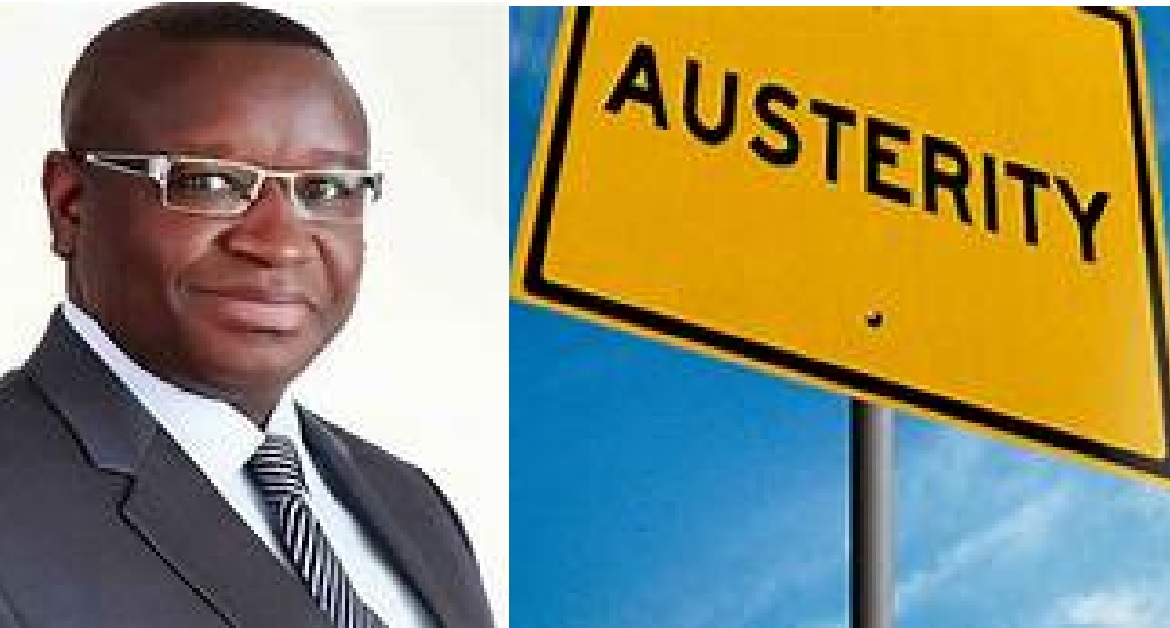There is no way out of the current excruciating economic crisis the government faces except to start with austerity measures across the board aimed at drastically cutting down on government’s ever-growing expenditures to reasonably be in line with the revenue generated by the State.
Currently, everywhere among educated elites, the advice is that the President should endeavour to come with austerity measures in order to downsize expenditures which is a set of political-economic policies that aim at reducing government’s budget deficits through spending cuts, tax increases, or a combination of both.
Basically, there are three primary types of austerity measures:
- Higher taxes to fund spending
- Raising taxes while cutting spending and
- Lower taxes and lower government spending
Austerity measures are often used by governments that find it difficult to borrow or meet their existing obligations to pay back loans. The measures are meant to reduce the deficit by bringing government revenue closer to expenditure.

Proponents of these measures state that this reduces the amount of borrowing required and may also demonstrate a government’s fiscal discipline to creditors and credit rating agencies and make borrowing easier and cheaper as a result.
It could be recalled that in October 2016, the former President on the advice of his Ministry of Finance declared a raft of austerity measures as a result of the extreme economic challenges that the country faced. The measures announced by the 2016 government were primarily aimed at reducing government expenditure. Then President Koroma told the nation that the measures that were announced in March will be implemented until the first half of 2017 “in order to stabilize the… economic situation.”
Currently with Sierra Leone’s debt having gone up beyond Le3.1 trillion of $3.1 billion, with the budget deficit widening every year; with NRA not generating enough revenue to pay debts and to meet the government’s expenditure needs, it cannot be denied that Sierra Leone, at the moment, faces a frightening economic crisis caused by high public expenditure, devaluation in the value of the Leones and low export earnings which further exacerbates the serious foreign exchange crisis the country faces.
To get round the problem, both the government and its citizens have to subject themselves to austerity – cut down expenditure.
The pasts administration introduced austerity measures which included:
- 30% cut in recurrent expenditures across the board
- A hold on all new domestically financed capital projects and suppliers’ contracts until further notice
- Now new procurement of government vehicles until further notice
- 50% cut in fuel allocations to all MDAs
- 50% cut in monthly imprests
- No purchase of new office furniture and fittings
- 50% cut in the purchase of mobile phone top-ups
- 70% of all payments to suppliers/contractors that have foreign component to be affected in Leones
- 50% cut in DSA for local travels
- Elimination of payment for overtime
- No purchase of office equipment – computers, printers, photocopiers, etc.
- Strengthening payments vouchers verification for ongoing activities at the MDA level
- Suspend all overseas travel for public officials except for essential and statutory travels.
- No DAS – top-up for sponsored international travel
- All seminars, retreats and workshops to be held in office facilities
- Restriction of all overseas travels and rationalized delegation sizes
- 50% cut across the board in vehicle maintenance
- Elimination of double payments of pensions and salaries across the board
- A moratorium on new recruitment in the Civil Service except for essential and critical vacancies
- All business outfits to pay outstanding arrears of taxes in the next 30 days
- Minimize discretionary banks to transfer monies in transit account within 24 hours
- Start effective implementation of the single Treasury Account.
According to the then government, the above were supposed to serve as reference for the 2017 budget and their continued implementation would support domestic revenue generating and help reverse the negative impact on the economy.
Underlying austerity is the fact that both government citizens cannot continue to spend more than they earn.
They have to stop borrowing beyond their means to repay. They have to cut down on buying of luxury items that they can ill afford.
On the part of the government, it has to scrap flying first class, hiring private jets for overseas travel paying outrageous per diem allowances for overseas travel, among others.
Generally, according to macroeconomists, austerity is a highly fiscal intervention designed to curtail hyper-growth in government spending, with a concomitant rise in taxes at a rate to ensure government’s budget deficit to be recorded over a period of time.
The draconian austerity measures imposed by the last government, the 2017 budget were aimed at placing a tight rein on government spending, a restrictive trade regime and tariffs resultant depreciation of the national currency.
According to the Exclusive Newspaper, at the moment what this administration needs to do most is to stop the continued devaluation of the Leone. The Leone from 2014 to 2015 depreciated from Le5,500 to the US Dollar to Le7,200. And when this administration acceded to power in 2018 stood at Le8,500 to the US Dollar which now stands at Le1,350,000.
What this means is that if the trend is not bucked, the cost of fuel and all imported items, as well as locally produced goods including food will continue to rise.




 Post a comment
Post a comment









